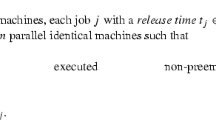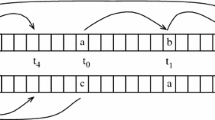Abstract
The “Priority Algorithm” is a model of computation introduced by Borodin, Nielsen and Rackoff ((Incremental) Priority algorithms, Algorithmica 37(4):295–326, 2003) which formulates a wide class of greedy algorithms. For an arbitrary set \(\mathbb{S}\) of jobs, we are interested in whether or not there exists a priority algorithm that gains optimal profit on every subset of \(\mathbb{S}\) . In the case where the jobs are all intervals, we characterize such sets \(\mathbb{S}\) and give an efficient algorithm (when \(\mathbb{S}\) is finite) for determining this. We show that in general, however, the problem is NP-hard.
Similar content being viewed by others
References
Alekhnovich, M., Borodin, A., Buresh-Oppenheim, J., Impagliazzo, R., Magen, A., & Pitassi, T. (2005). Towards a model for backtracking and dynamic programming. In Proceedings of the 20th annual IEEE conference on computational complexity (CCC) (pp. 308–322).
Angelopoulos, S. (2003). Randomized priority algorithms. In Lecture notes in computer science : Vol. 2909. Approximation and online algorithms, Proceedings of the 1st international workshop, WAOA (pp. 27–40). Berlin: Springer.
Angelopoulos, S., & Borodin, A. (2002). On the power of priority algorithms for facility location and set cover. In Lecture notes in computer science : Vol. 2462. Approximation algorithms for combinatorial optimization, Proceedings of the 5th international workshop, APPROX (pp. 26–39). Berlin: Springer.
Arkin, E. M., & Silverberg, E. L. (1987). Scheduling jobs with fixed start and end times. Discrete and Applied Mathematics, 18, 1–8.
Borodin, A., Cashman, D., & Magen, A. (2005). How well can primal-dual and local-ratio algorithms perform? In Lecture notes in computer science : Vol. 3580. Proceedings of the automata, languages and programming (ICALP) (pp. 943–955). Berlin: Springer.
Borodin, A., Nielsen, M. N., & Rackoff, C. (2003). (Incremental) Priority algorithms. Algorithmica, 37(4), 295–326.
Carlisle, M. C., & Lloyd, E. L. (1995). On the k-coloring of intervals. Discrete Applied Mathematics, 59(3), 225–235.
Cormen, T. H., Leiserson, C. E., Rivest, R. L., & Stein, C. (2002). Introduction to algorithms. Cambridge: MIT Press.
Davis, S., & Impagliazzo, R. (2004). Models of greedy algorithms for graph problems. In Proceedings of the 15th annual ACM-SIAM symposium on discrete algorithms, SODA (pp. 381–390). Philadelphia: SIAM.
Graham, R. L., Lawler, E. L., Lenstra, J. K., & Rinnooy Kan, A. H. G. (1979). Optimization and approximation in deterministic sequencing and scheduling: a survey. Annals of Discrete Mathematics, 5, 287–326.
Horn, S. L. (2004). One-pass algorithms with revocable acceptances for job interval selection. MSc Thesis, University of Toronto.
Papadimitriou, C. H. (1994). Computational complexity. Reading-Harlow: Addison-Wesley–Longman.
Papakonstantinou, P. A. (2006). Hierarchies for priority algorithms for job scheduling. Theoretical Computer Science, 352(1–3), 181–189.
Regev, O. (2003). Priority algorithms for makespan minimization in the subset model. Information Processing Letters, 84(3), 153–157.
Vollmer, H. (1999). Introduction to circuit complexity—a uniform approach. Berlin: Springer.
Author information
Authors and Affiliations
Corresponding author
Additional information
This work was partially supported by a grant from the Natural Sciences and Engineering Research Council of Canada.
Rights and permissions
About this article
Cite this article
Papakonstantinou, P.A., Rackoff, C.W. Characterizing sets of jobs that admit optimal greedy-like algorithms. J Sched 13, 163–176 (2010). https://doi.org/10.1007/s10951-009-0148-2
Published:
Issue Date:
DOI: https://doi.org/10.1007/s10951-009-0148-2




